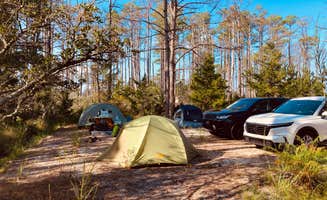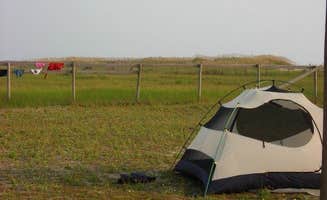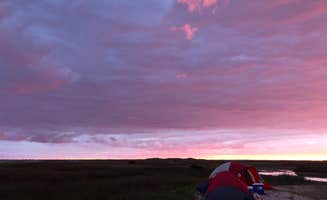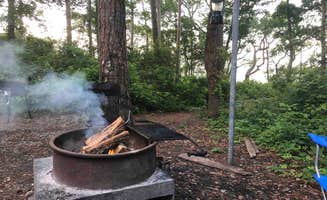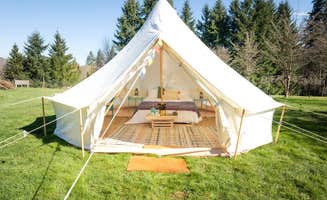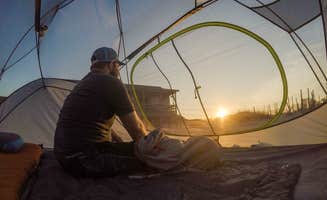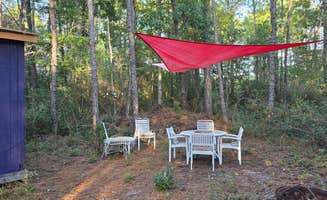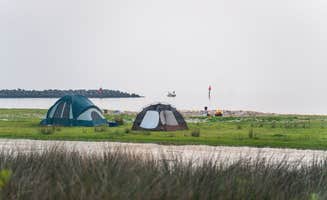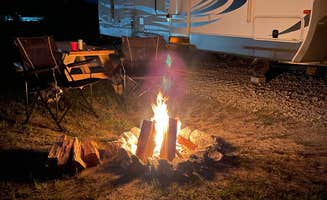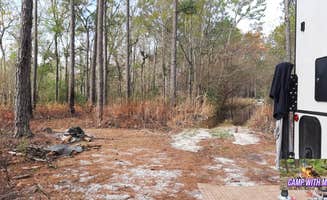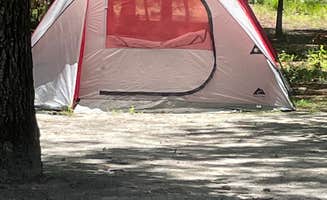Camping near Marshallberg, North Carolina offers coastal experiences ranging from primitive beach sites to rustic cabins. Located on the southern Outer Banks, campers face wide temperature swings with summer highs reaching 90°F and humidity levels over 80%. Salt spray affects camping equipment throughout the region, requiring regular cleaning of tent zippers and metal components to prevent corrosion.
What to do
Kayaking and water access: At Oyster Point Campground, you can launch directly from your campsite. "We were able to launch kayaks almost directly from campsite #11," notes Laura F., who appreciated the easy water access despite the campground's rustic nature.
Beach walking and shelling: Ocracoke Campground provides extensive beach exploration opportunities. "I walked two miles south from our site and could have walked much further if I wanted," shares Lee D., who visited in early April and found the beach largely uncrowded.
Wildlife photography: The Cedar Point Tideland Trail offers unique photography opportunities. "This area is a photographer's dream, especially if you like photographing the native habitat and creatures. I was able to get photos of birds, soft shell crabs, and closeup photos of dragonflies," reports Myron C. who visited Cedar Point Campground.
What campers like
Privacy between sites: At Oyster Point Camp, the natural vegetation creates secluded spaces. "Campsites are large and spread out. Foliage provided privacy between sites," observes Jody B., who stayed for two weeks and noted the diverse camping styles from tents to RVs.
Solitude and empty beaches: South Core Banks Beach Camping provides remarkable isolation. "See someone nearby, cool, whatever. Drive somewhere else and set camp," explains Vince Z., highlighting the freedom to find your own space on this barrier island.
Waterfront views: Many campers value the water proximity at coastal campgrounds. "Sites with water view are best," advises Roger W. about Oyster Point Campground, noting that sites #9 and #11 have pathways to small private beaches, making them particularly desirable.
What you should know
Ferry logistics: Access to many island camping areas requires advance planning. For Long Point Cabin Camp, "you have to take a ferry to reach the cabins. Because of this you, and the other temporary residents of these cabins, have the island all to yourselves," explains Zach W., who adds that you must bring all necessities with you.
Vehicle requirements: Beach driving demands appropriate equipment. "Sorry 2WD Chevy Tahoe with aggressive tires - stay home," warns Vince Z. about South Core Banks, emphasizing that "Tow service ain't nowhere to be found" for vehicles that get stuck.
Bug protection: Insect repellent is essential at most coastal sites. "The mosquitos are relentless!" warns Virginia W. about camping on Portsmouth Island in early October, despite having the beach to herself.
Tips for camping with families
Best bathroom facilities: Cedar Point Campground offers more developed facilities than most area campgrounds. "The bathhouse looked as if it had been built recently, and the concrete looked fresh. Inside, there are individual showers separate from the toilets," notes Myron C., though he cautions that some showers were out of order during his visit.
Accessible recreation options: Family-friendly activities are concentrated near certain campgrounds. "While the campground was busy (early May) it didn't feel over crowded... everything we wanted to do was only a short drive from the campground (including batting cages and mini golf)," shares Sarah C. about Cedar Point.
Swimming considerations: Beach conditions vary significantly across sites. At Ocracoke, one visitor reported "water was warm but the surf was a bit rough so I only went out about waste deep (Rip current)," suggesting families should monitor ocean conditions carefully.
Tips from RVers
Limited hookups: Cedar Creek Campground & Marina provides more services than most area options. "Great-sized RV site with plenty of additional parking. The boat launch went smoothly," reports David B., who appreciated the combination of camping and water access.
Solar power viability: For boondocking RVers, solar capabilities matter. At Oyster Point, Roger W. notes: "Solar: Maybe too forested in some spots. In site #5 at 9:00 AM we had some solar charge happening," suggesting partial charging is possible but full reliance on solar may be challenging.
Road conditions: Many campgrounds have rough access roads. "The gravel road had a lot of ruts in it so getting my trailer with kayaks in and out was a lot of trouble," explains Laura F. about Oyster Point Campground, highlighting the need for cautious driving when towing.


